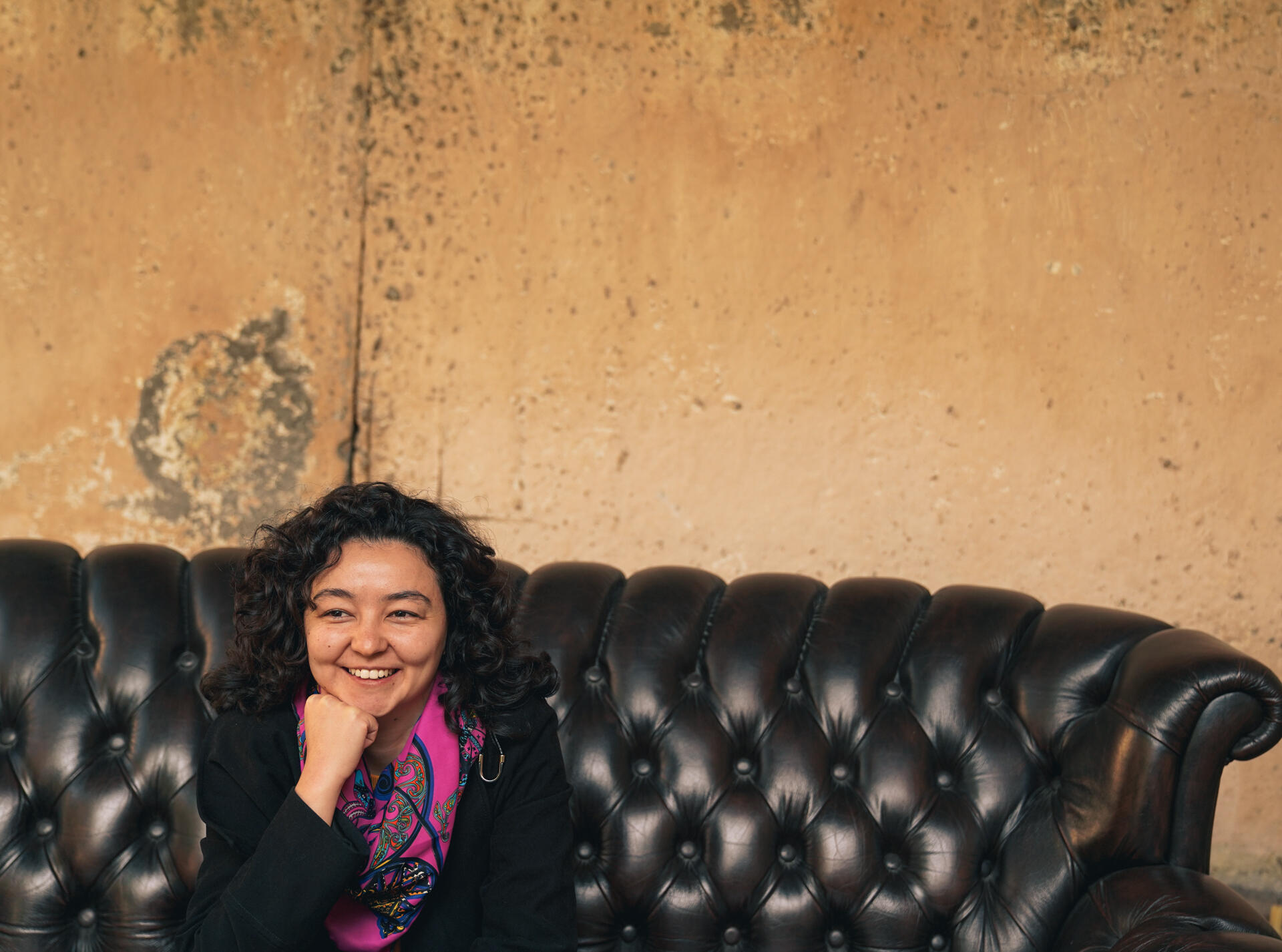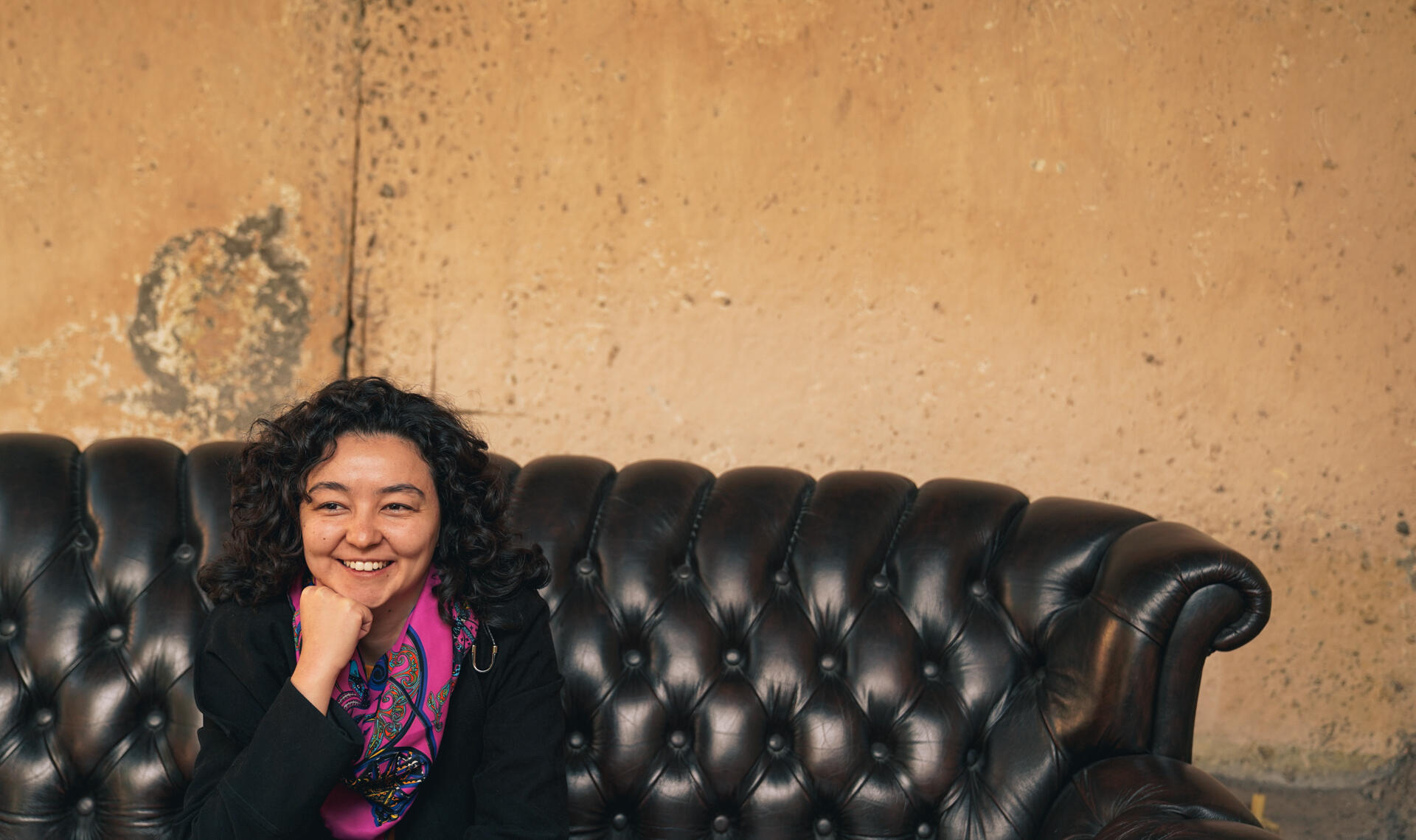Leyla Zuleikha Makhmudova is a civic activist and co-founder of FemAgora, the Central Asian festival of gender equality. In a conversation with Adamdar/CA, Leyla spoke about Central Asian feminism, the Suzak language, why she sued the Akimat of Almaty, and how the chains of fear are breaking.
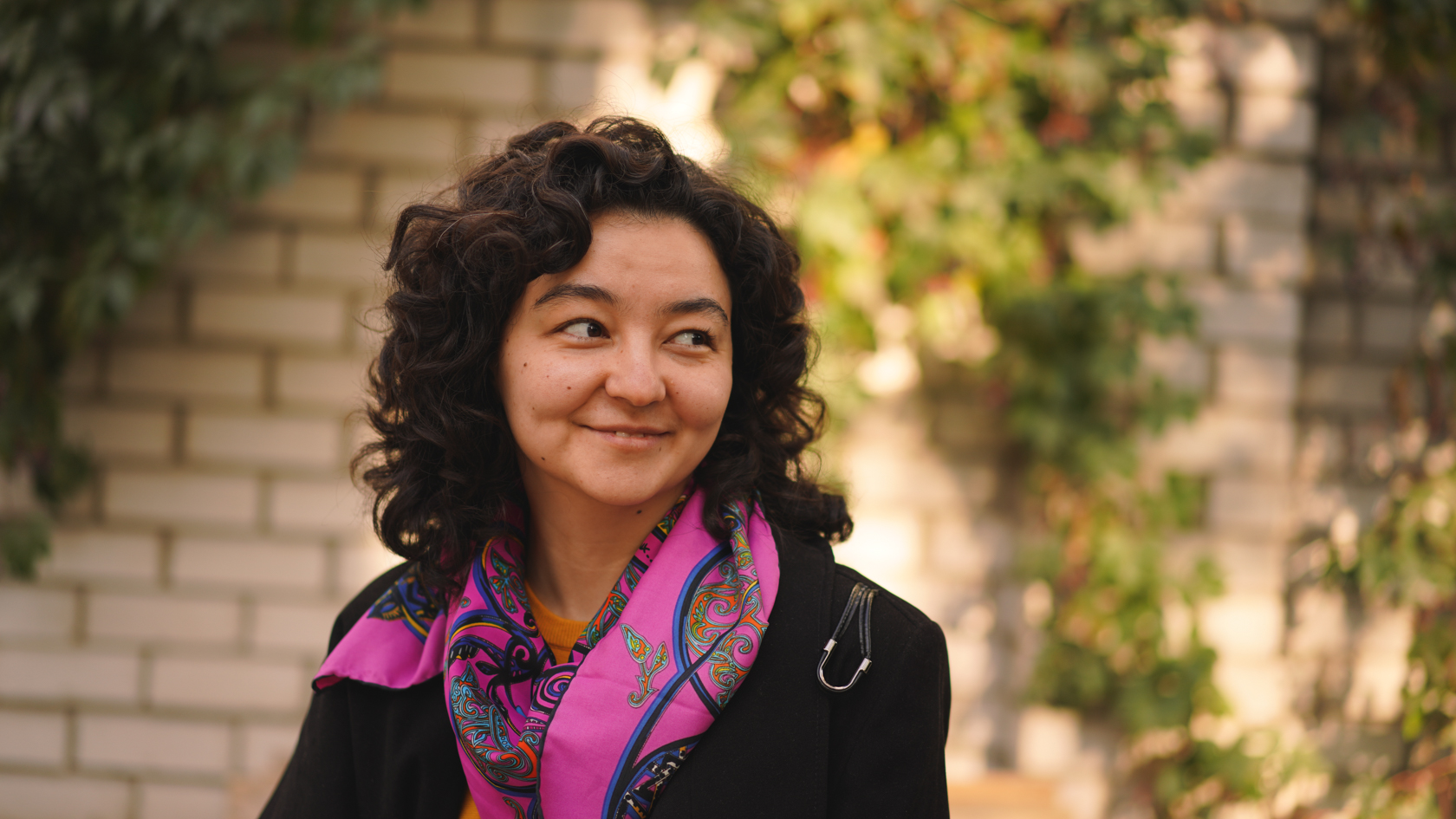
ZULEIKHA
My first childhood memory is playing in our village, Taukent in the Turkestan region. Since Soviet times, it has been a village for those in the area who mine uranium. It is a rather deserted place near the Karatau mountains. Later, when I moved to Almaty, I was not particularly astonished by the mountains there, because I myself had grown up near them. They were simply a fact of life for me. When other visiting students marveled at the Almaty mountains, I thought: “Well... mountains are mountains.”
Not far from Taukent was the village of Suzak, where my relatives on my father’s side lived, because in the 1920s my great-grandmother was deported from Karabakh to this village.
I am impressed by the story of my great-grandmother. Her name was Zuleikha. Her husband had several wives, and somehow she was able to save some of her own children, as well as some of his, during the repressions and deportations. Together with them, she was deported to South Kazakhstan, to Suzak. I think that it was she who gave us life.
When surnames are discussed, the ancestor who raised the clan is usually implied. I believe that from my paternal line, it was Zuleikha who raised us. If it were not for her, her care, and her hard work in order to raise all of her children, then I don’t think any of us would exist at all.
In 1993, my great-grandmother lay near death, and my mother, being a daughter-in-law in my father's house, frequently talked to her. It is surprising and interesting that they managed to speak with each other, despite the fact that my great-grandmother spoke Azerbaijani, and my mother spoke a mixed Uzbek-Kazakh language, which is to this day called the Suzak language. Mama is a very empathic, inquisitive woman; she took care of my great-grandmother in the last months of her life and listened to her stories. From her, my mother learned and committed to memory many stories about my father's family and their life in the Caucasus. For me, this is a very poetic story — much of it resonates with what I am doing now. Women's stories are never interesting to anyone. The events that happened to my grandfather, great-grandfather or other men are always recorded, remembered, transmitted. After all, everyone knows about whatever men do — go to war, harvest crops, and the like. Everything is written down under their names. But if you do not listen, remember, and transmit the stories of the women of your family, then they will not be documented anywhere. I cannot find out who my grandmothers and great-grandmothers were and what they did through recorded history, because such records of their lives and deeds do not exist.
I cannot find out who my grandmothers and great-grandmothers were and what they did through recorded history, because such records of their lives and deeds do not exist
FEMINISM
I don't know when exactly I realized why feminism is important to me or why I am a feminist. But I remember that as a child I was very offended and angry when I was not allowed to go out in the evenings. Мy older brother could do anything, but there was much I could not do just because I was a girl. It is clear that this was for safety reasons, but I didn’t like it very much. And every time someone diminished me or made a comment about my girlhood, or womanhood, or perceived lack thereof, it was all unpleasant for me.
I think that feminists are awesome women. They were able to create a whole academic framework and philosophical theory. How many other identity-based movements in the world are capable of this? In the short history of its existence, feminism can say that it has succeeded, and this blows my mind.
Unfortunately, we, in Central Asia, do not have feminist theory. You will not see a single academy, university or even a department that specializes in gender theory, despite the fact that feminist theory today has far surpassed solely activist work. Feminist theory is already an accepted philosophical perspective that studies the distribution of power and resource distributions, among other things. Everything in the world that has happened and that is happening may be seen through the broad prism of feminism. In the post-Soviet world, this theory is developed in Ukraine, Belarus, and Russia, but unfortunately, Central Asian academic feminism does not yet exist. All feminists who are engaged in research are part of other institutions that either do not position themselves as feminist at all or are not in Central Asia.
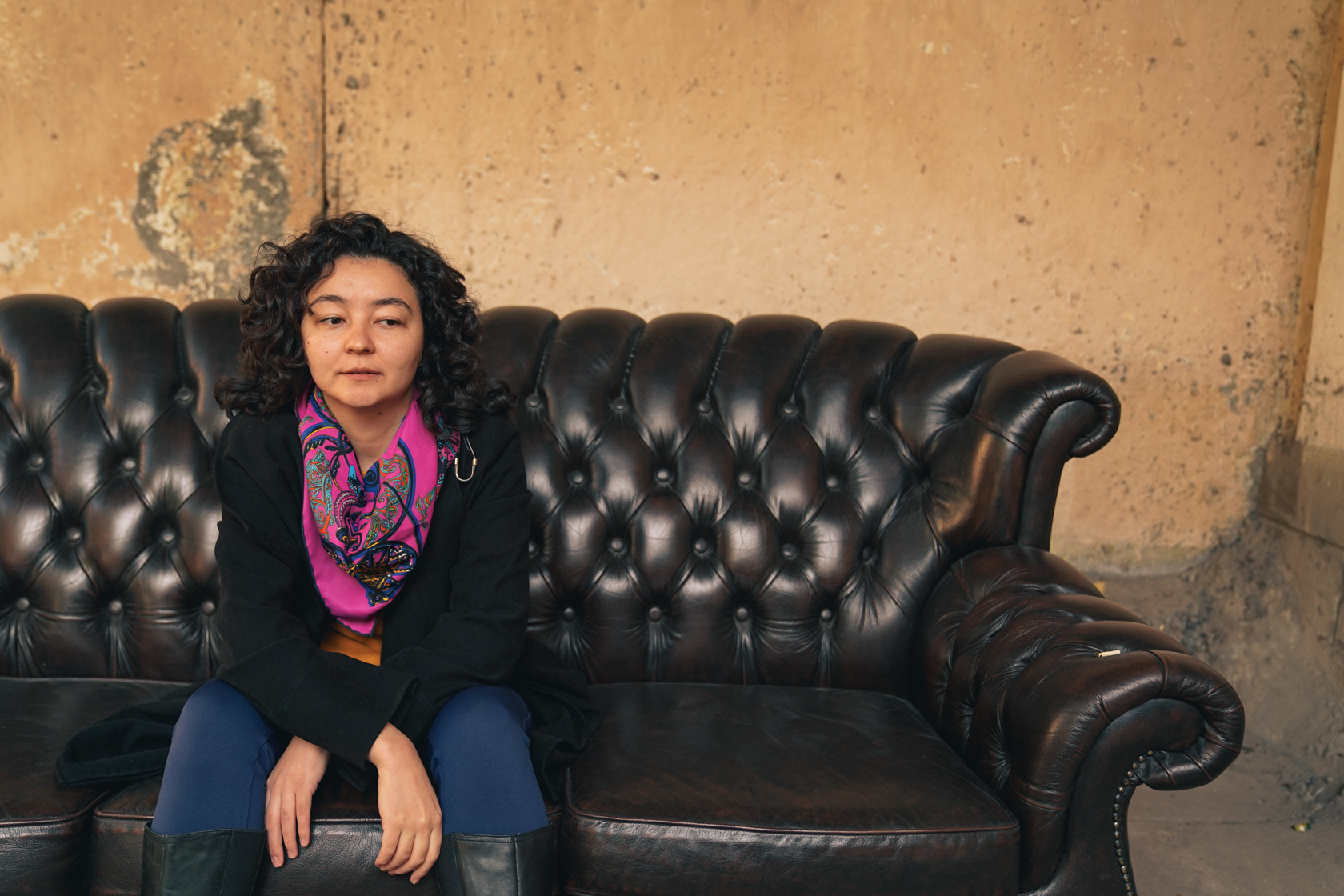
For this reason, feminism is developing in our country mostly on the activist level.
In academic feminism, the center of any research is always the research subject. This inevitably involves questions about whether you are able to research a topic. How well will you be able to understand it? How can you ensure the comfort and safety of the research subject? Do you have the right to research it?
For me, feminism is a pillar of support. A personal approach is the key to understanding feminism and to uncovering feminist theory in Central Asia. For me, this means self-reflection. In my circles, we even say, “I am the expert of my own experience.” If we can trace, filter, and understand our own experiences through a feminist lens, these experiences will fall into the big-picture perspective. Therefore, it is very important for us at FemAgora that all our speakers speak on their own behalf about themselves, their experiences, their communities, and not be alienated experts.
For me, feminism means self-reflection
I think this approach is especially important for us, because most documentation and academic knowledge about Central Asia, unfortunately, is still not in Central Asia. Academics from abroad come, study, become “experts” in the region, and tell the whole world how everything happens here. As a rule, such researchers come for several days; at best, they come for several months. But what can be understood about culture and life in a few months, let alone a few days?
If foreign researchers receive information from local people who can speak the same language as them, this means that we already have people who themselves could become local experts and share knowledge with the world on their own behalf and on behalf of their region. But we do not have the necessary resources. There is neither formal support nor scientific centers where such people could work, and because of this, local experts simply pass their knowledge on to foreigners. The result is that the region does not speak for itself.
FemAgora
The first feminist project of my choice for me was TEDxWomen in 2016. When I saw that TEDx had an initiative for women, I decided that I had to do it. Today, with my current experience, I look back at those initiatives and understand in retrospect that I probably would have done a lot of things differently. But would I even be interested in doing TEDx now? No, because now I'm interested in FemAgora — a completely independent, grassroots format that builds and develops itself. It was important for me to come to this realization through my own experience.
As I was finishing my studies at Suleiman Demirel University in Almaty, a new professor arrived. His name was Moldiyar Ergebekov , and he was a conspicuous presence: sociable, atypical, informal. I became aware of him at that time, but we became friends much later. He was a speaker at the first TEDxAbayStWomen. At the next event, he helped us as a volunteer. In 2017, when I was preparing for the second TEDx, Moldiyar suggested that we create our own festival, saying that we needed our own voice. I became especially enthusiastic when he brought up the fact that on March 8, we only hear sexist slogans like “May women please the eyes of men” or “May there be female happiness.” This is the day when feminists should shine and demonstrate female expertise and solidarity.
We decided to attempt such an event. So, in 2018, we made the first FemAgora festival. It was held on March 8, 9, and 10. The program included discussions, an exhibition, film screenings, speeches by activists and experts on various topics. Moldiyar and I agreed that the festival should be Central Asian. For example, he wanted to see Umida Akhmedova as a speaker from the very beginning, and now she participates in each of our festivals. We deliberately continue to invite the same core team of speakers because it is very important for us to build a community and provide this particular community with a platform to track and document what is happening in their lives.
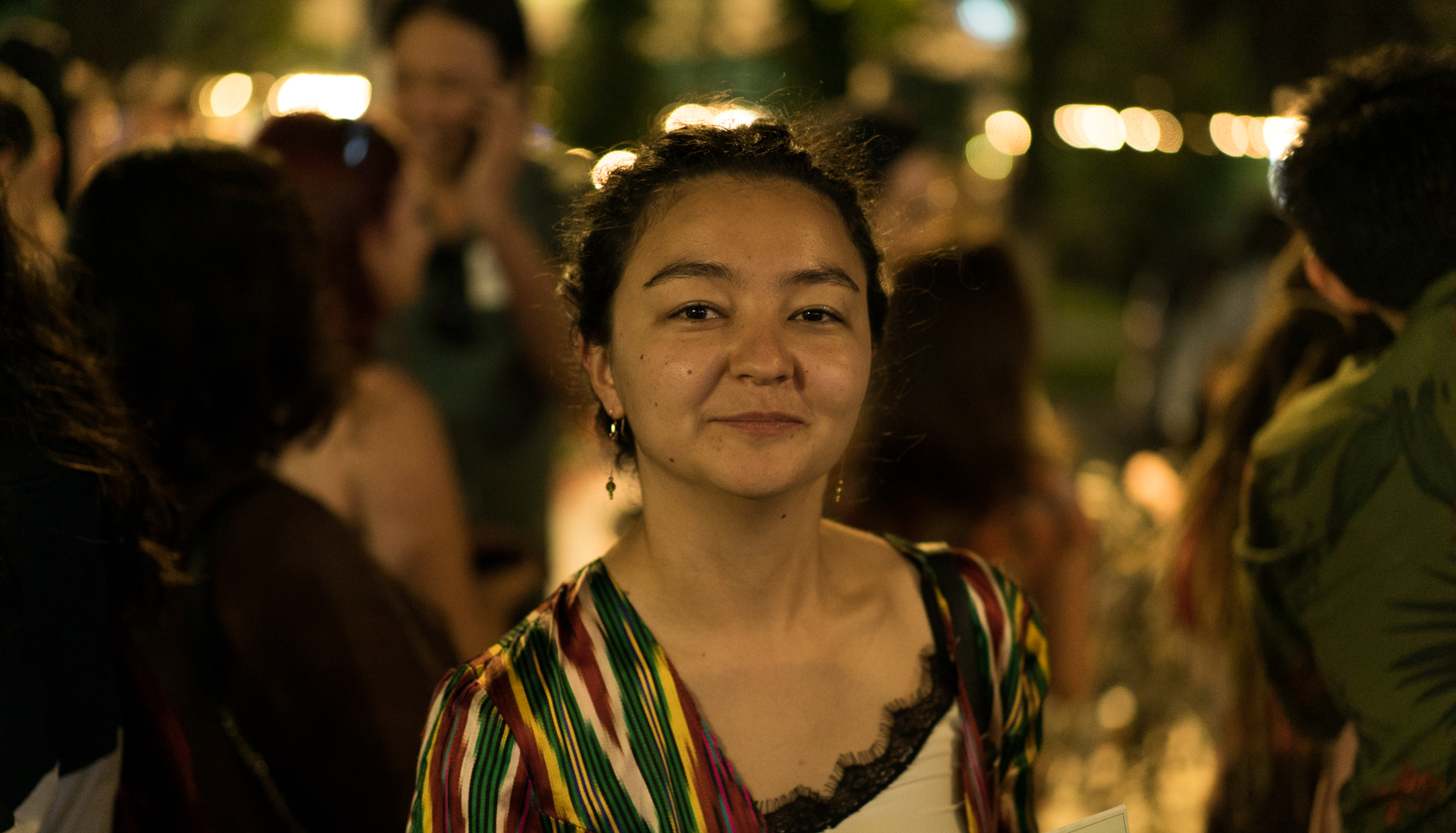
FemAgora is a Central Asian platform. We talk about Central Asia because we understand each other’s experiences, and this gives us something to talk about. We speak Russian, our own, “Central Asian” Russian. We should continue to use this resource to communicate. The Russian language gives us the opportunity to read each other’s work, follow each other, and get to know each other.
We talk about Central Asia because we understand each other’s experiences, and this gives us something to talk about
Central Asia is important to me personally because I grew up in a village in the south of Kazakhstan. I am not ethnically Kazakh: my dad is from Karabakh; they are Azerbaijanis, and my mother is an ethnic Uzbek. As a child, I felt uncomfortable that I was not ethnically Kazakh, as if because I am not Kazakh, I do not fully belong to Kazakhstani society. And when I lived with relatives in Tashkent, I found myself on the other side of this: it was undesirable to speak Kazakh there. This greatly affected my identity: all my life I had to choose who to be, Uzbek or Kazakh, depending on where I was. Now I do not have to choose, because I am in Almaty, a city in which it is culturally and logistically convenient to be any kind of Central Asian.
It is for this reason that our festival is Central Asian, just as I am a Central Asian.
The first FemAgora festival lasted three days; this year, it lasted six weeks. For many, the most noticeable difference is that the festival has become longer and broader in scope. But I don’t think this is the point. The important thing is not that the festival has become longer, but that it has become more organic; it has acquired its own identity, its own questions. I think this is the coolest thing.
ACTIVISM
Civil activism is also a big part of me. I think that if you are in feminism, then you will definitely be involved with civic and political activism.
Long before fem-activism and actionism became mainstream last year, KazFem, a grassroots feminist initiative, was engaged in that work. They are very brave. They organized the first women's march on the Arbat back in 2016. If it were not for the work of KazFem and their rallies and protests, then we would not have the feminist activism in Almaty that we see today. They normalized these civic actions for local feminism.
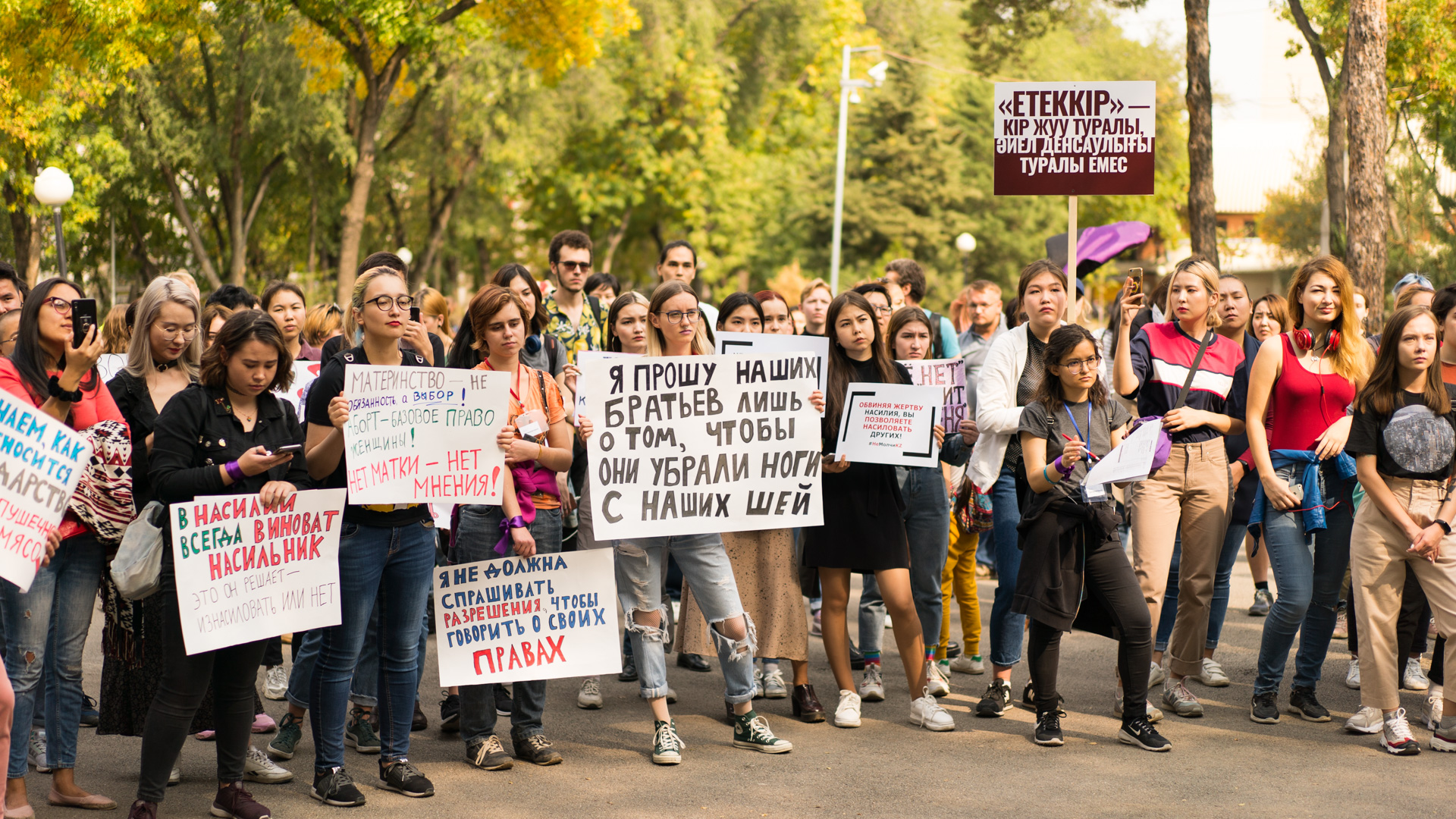
Photo by Timur Nusimbekov
It is important that a community exists — a place to gather inspiration and see that feminist organizing is normal and correct. For example, in 2019, KazFem petitioned the Almaty Akimat multiple times to hold a rally, and so did we. During the year I personally submitted about 4-5 applications, and all were rejected. In response, I filed a lawsuit against the Akimat. Now, I am in the process of making my case before the Kazakh court that it is unfair for the Akimat to take away my civil rights. We have already gone through the City Court’s appeals process. It was a comedy show. Present before the judge were my lawyer and I. The judge interrupted us constantly. When we had finished, the judge said: “Now, the debate of the parties.” What debate? Only my lawyer and I were present at the hearing! So basically, nothing changes. Ahead of us now lies the Supreme Court.
This is my first experience personally conducting a legal case. It’s not on property law or even on physical violence committed against me, which might have been a more realistic case in which to expect a favorable outcome in court. It is, namely, against a state body due to the fact that it infringes on my civil rights and violates my right to peaceful assembly. What will happen next, we can only speculate, but for us this is a strategic matter. I say “for us” because I was supported by the “Feminita” movement. They are now in charge of my case, because they have extensive experience in conducting such processes.
For several months we applied for permission to hold a march on March 8, but as usual, we were rejected. We, along with feminists from various organizations, held lengthy discussions on how to proceed in order to attract as many feminists as possible without harming participants of the movement for whom it is important to maintain discretion, such as employees of crisis centers or human rights defenders who, in their work, interact with government agencies.
As a result, we decided that it was very important to do everything the way we wanted — not on the outskirts of the city, not behind the Sary-Arka movie theatre in an “authorized” format. We decided to march in a conspicuous place, and to announce it so that those who wanted to could join us. On the morning of March 8, we were surprised when we saw the number of people who had gathered. I attribute our high turnout to the events of last year; they normalized going out and speaking at rallies or marches, and more importantly, they normalized feeling right to do it.
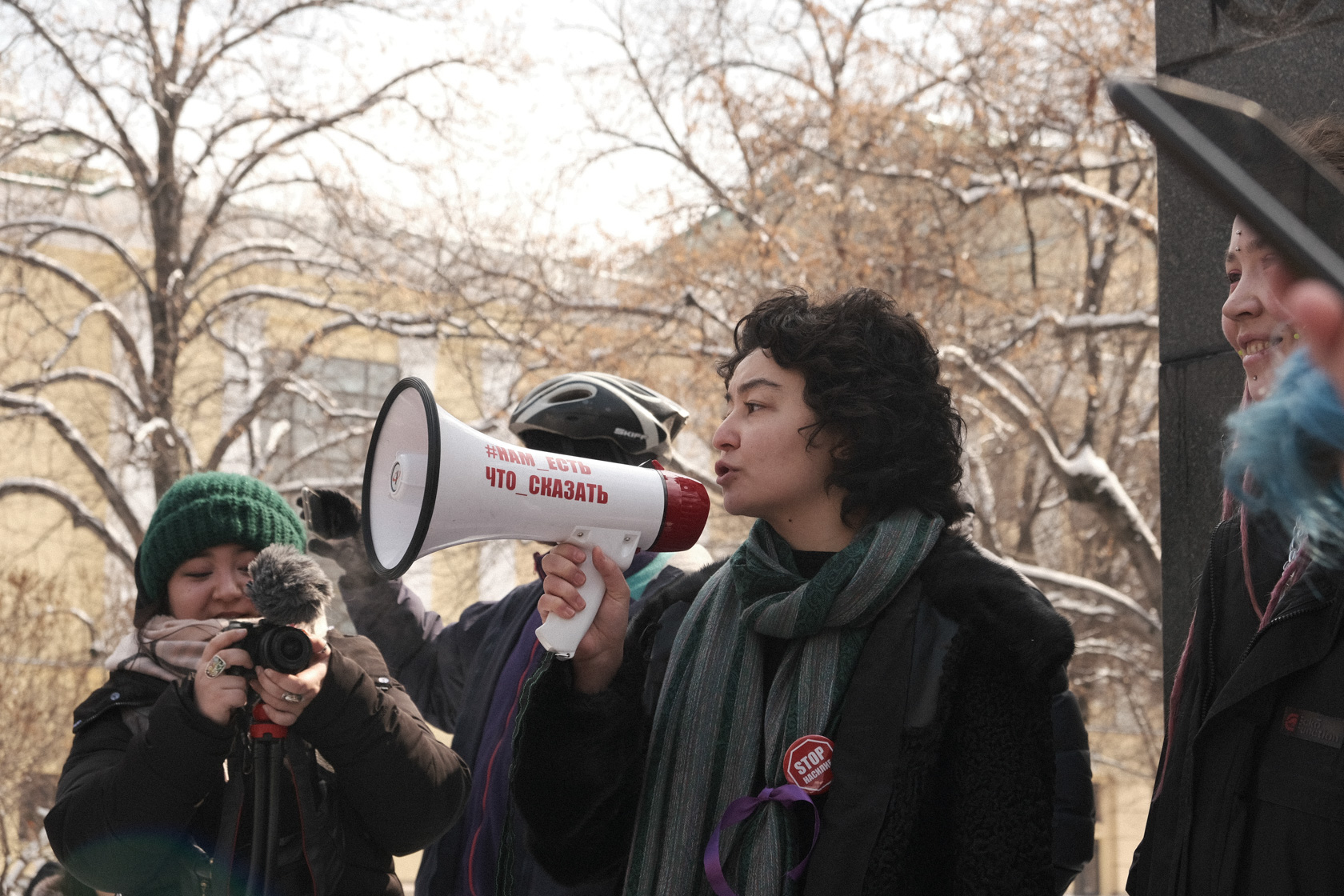
Photo by Timur Nusimbekov
Why was it important for us to march in the city center? In the city center, everyone has access to comfortable infrastructure and transport. In addition, this is how the march becomes visible: people who walk in the center or live there are watching what is happening.
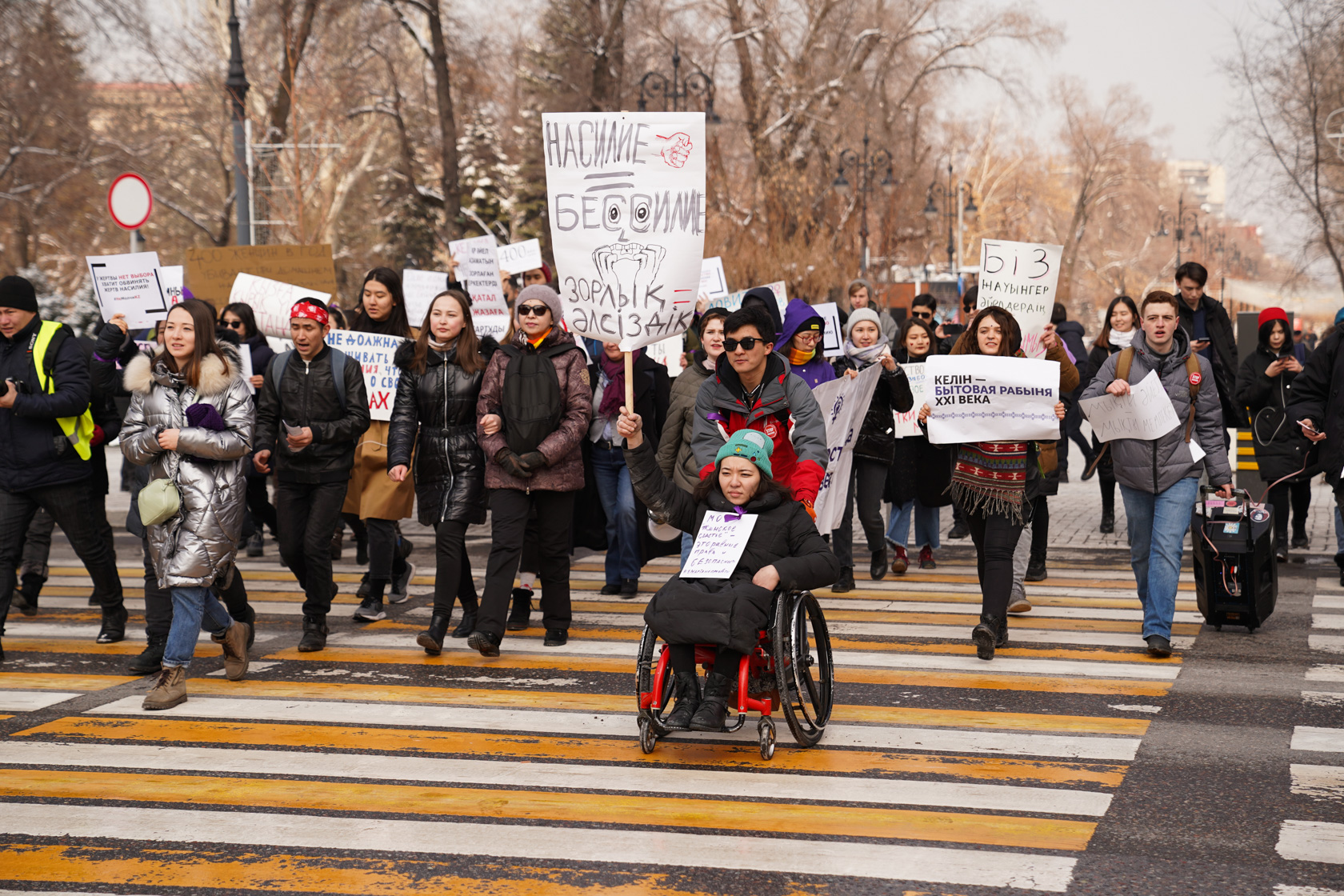
Photo by Malika Autalipova
I am in favor of building spaces where people can come and participate in discussions and activities that they are already interested in. For example, yesterday I had a discussion called “The crisis of masculinity”, a topic that is also explored through fem-theory. I was not offended that only a few people were listening; it is important to me that such a discussion should even take place in Central Asia, so that I or another person interested in such topics does not have to seek out international platforms where completely different people who lack our Central Asian context talk about what a crisis of masculinity is. Yes, foreign perspectives are interesting too, but I'm more interested in hosting the discussion here. Even if I am having a conversation and no one is present but me, it will still greatly affect something, just like KazFem activists once influenced other activists and feminists like me.
All that can be done now is to piece together the community that exists and try to grow something from it, develop opportunities, and increase visibility.
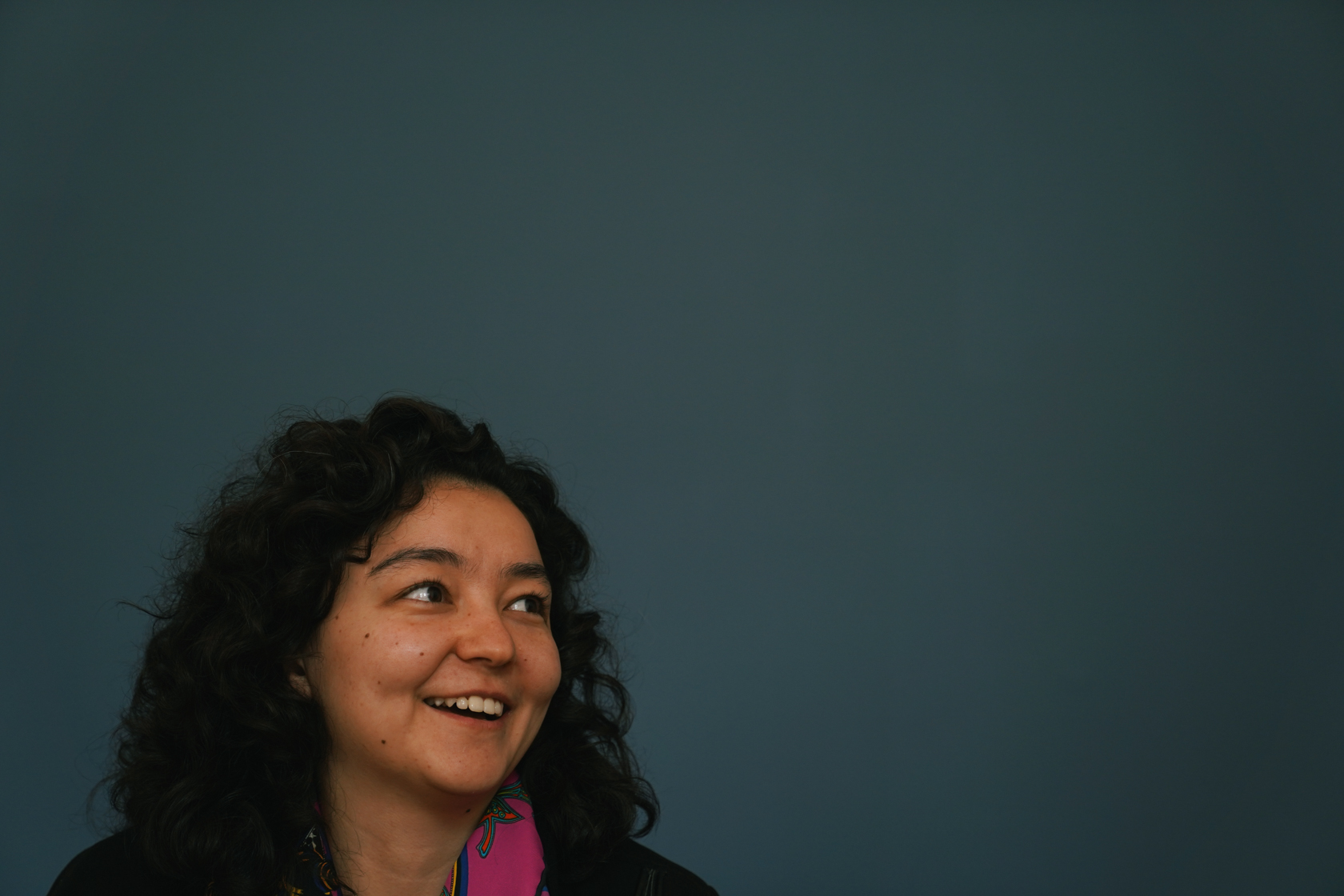
On March 8, we held our March. One of the most meaningful moments of that day was when we stopped on Panfilov Street to sing the song “Bread and Roses”. When we started singing, I realized that we were sharing a moment of solidarity. People around us stopped: some with bewilderment, some with admiration, some just looked and took pictures. A communal feeling pulsed through everyone gathered there on that day — the feeling of the chains of oppression and fear within us beginning to break themselves.
We shared a communal feeling — the feeling of the chains of oppression and fear within us beginning to break themselves.
